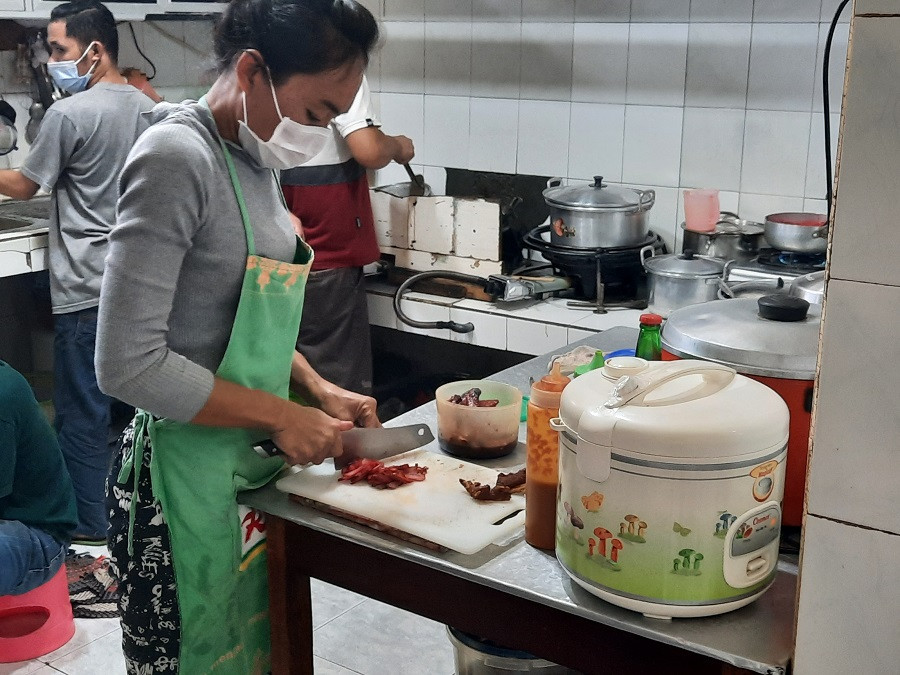Popular Reads
Top Results
Can't find what you're looking for?
View all search resultsPopular Reads
Top Results
Can't find what you're looking for?
View all search resultsConsumers less confident but keep spending
Indonesians slightly more wary about economic prospects.
Change text size
Gift Premium Articles
to Anyone
A
n expectation of harder times ahead is making Indonesian consumers wary about their economic prospects even as retailers across the country are reporting fast year-on-year growth in sales.
According to data published by Bank Indonesia (BI) on Tuesday, the Consumer Confidence Index (CCI) slipped by 5 points (bps) to 123.2 points in in July, extending a marginal decrease of 0.7 points recorded in June.
Despite the decrease, consumers are still considered confident, as any reading above 100 indicates optimism, while figures below that threshold mark overall pessimism.
Based on the results of regular opinion surveys, the CCI is used to gauge how optimistic consumers feel about current economic conditions and includes views on inflation and labor market prospects.
“The decline in consumer optimism in July 2022 was driven by a decline in both consumer optimism regarding current economic conditions and consumer expectations for the future economic [development]. However, both of them remain strong,” BI spokesman Erwin Haryono said at a presentation of the latest data on Monday.
Read also: Indonesia shines amid global gloom with forecast-beating GDP
The current conditions subindex fell by 3.6 points to 110.9, while the expectations subindex dropped by 6.3 points to 135.5.
Consumer confidence dropped across all affluence categories in July, but particularly so among consumers spending between Rp 4.1 million and Rp 5 million a month.
Erwin characterized the overall results as a "slight moderation compared to the previous period".
The weakening trend in consumer confidence is not reflected in the retail sales index, where the latest report was also published by the central bank on Tuesday.
The retail sales index (RSI), which is based on BI estimates, was up 8.7 percent year-on-year (yoy) at 204.9 points in July.
However, the strong annual increase is based on particularly weak turnover in the comparison period, as government measures to contain the coronavirus pandemic severely impacted shopping in mid-2021.
On a monthly basis, the RSI dropped by 0.8 points, extending an 11.8-point monthly drop recorded in June.
The largest yearly increase in sales was recorded in the vehicle fuel subcategory, which increased 66.9 percent yoy, followed by clothing and automotive spare parts, which rose 49.5 percent yoy and 34.6 percent yoy, respectively.
Vehicle fuels also recorded the largest monthly sales increase, growing 9.8 percent, followed by recreational items and household items with increases of 5.8 percent and 2.6 percent, respectively.
The RSI, which is measured through a monthly survey estimating sales by retailers, is also used to gauge consumer appetite and the overall health of the retail sector.
“In July 2022, sales [were] expected to continue the upward trend on an annual basis,” the report states.
Retailers continue to be optimistic about their prospects, as the sales expectations subindexes for the next three and next six months rose by 2.4 points mtm to 149.6 and by 4.7 points mtm to 157, respectively.
Retailers remain concerned about price pressure, meanwhile, as the price expectations subindexes for the next three and six months rose 10 points mtm to 137.5 and 6.4 points mtm to 138.5, respectively.
Inflation in Indonesia reached 4.94 percent in July, the highest annual increase in seven years, according to Statistics Indonesia data published earlier this month.
Read also: Inflation at seven-year high, exceeding BI’s revised outlook
Institute for Development of Economics and Finance (INDEF) economist Abdul Manap noted on Tuesday that the strong yearly increase in sales was unsurprising, as the Delta variant was ravaging the nation's consumer economy in July last year.
Even though the now-prevalent Omicron variant of the virus still posed a risk, the main challenge for the retail sector was the skyrocketing commodity prices and the uncertainty caused by the war between Russia and Ukraine, he continued.
For consumer spending, the Omicron variant was the biggest threat, he said, as a rise in cases could prompt the government to impose new mobility restrictions, which could reduce household income.
“With regard to commodities, not everyone is impacted negatively, because commodity-producing regions will enjoy a windfall, such as [the provinces of] Kalimantan and Jambi,” Abdul told The Jakarta Post.










